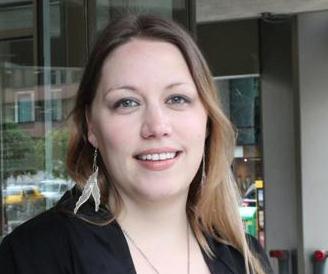
Stevie Mikayne says it takes a long time for most people to love themselves and be comfortable with who they are. Credit: Kandace Blaker
Toronto native Stevie Mikayne is living the dream. After venturing to Ottawa 10 years ago, she fell in love, got married and found a job with a US publishing company that allowed her to work from home. She’s also recently published her first novel, Jellicle Girl. Xtra recently chatted with the first-time author.
Xtra: The book depicts a character named Beth who struggles to accept her past, and herself. Can you describe her journey toward self-acceptance and why you found this to be an important theme for your novel?
Stevie Mikayne: Beth has a lot to overcome, particularly her relationship with her mother and how that has damaged her ability to accept herself as she is. Honestly, I think that no matter how far we’ve come, we’re still leaps and bounds away from people in our community feeling like being gay is 100 percent okay — a lot of us still deal with shame and discrimination and misunderstanding, so self-acceptance remains a relevant theme in LGBT lit.
Does this book reflect your own struggles with self-acceptance?
In a way, I think it does. Looking back, I realize how much of my difficulties growing up had to do with this difference I saw in myself but couldn’t name. Self-acceptance doesn’t begin or end with one aspect of your identity. It’s a constant struggle, a daily affirmation. From the way you look, to the way you look at the world, your “self” is an evolution. You’re not going to open your eyes one day and think you’re fabulous. You have to chip away at your character constantly, and then one day, you’ll realize you like yourself for who you are — that what you aren’t doesn’t matter anymore.
Ultimately, what is the message you are trying to share through this book?
The message I am trying to share is that secrets are shackles best undone and discarded. My goal with this book was to bring LGBT issues to the mainstream community. To have a cast of characters that everybody could relate to, and to make some of our common struggles easily understood to people who might not otherwise have a window in.
What was your writing routine?
God! This book took so long to write that it’s impossible to say. I normally write in the mornings, waking up slowly with a cup of tea and making the most of that hazy half-sleep that sometimes channels creativity. That’s probably what I did. It took 10 years from the initial concept to the final published copy. I’m really happy with it now. I’m glad I took so long with it to polish it and make it what I wanted. And I’m glad it was the debut. I always thought it should be.
Is there anything else you can picture doing with your life, other than writing?
People are always telling you it isn’t feasible to make a living as an artist of any kind, so I took an undergrad in psychology because I thought it was the “sensible” thing to do. Ultimately, though, it isn’t the sensible thing to do if you don’t love it. I needed more creativity in my life. With this career path I don’t get bored, because once I finish writing something, I get to move on to another project. I’ve never had a full-time, regular, paid job with benefits, because I was afraid that if I succumbed to that I would get stuck and never pursue my dreams. As Margaret Laurence once said, “When I say work, I mean writing. Everything else is just odd jobs.”

 Why you can trust Xtra
Why you can trust Xtra


